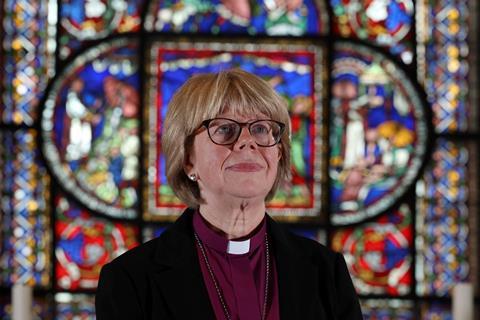Abortion is the defining human rights issue of our time, says Dr Calum Miller. For the incoming Archbishop of Canterbury Dame Sarah Mullally to identify as ‘pro choice’ puts her at odds with Christ’s own teaching, he says

Much has been said about Mullally’s position on same-sex unions and (obviously) her sex. Less well-known is her position on abortion.
In a 2012 blog post, she said she would describe herself as “pro-choice rather than pro-life”, while noting that she would be pro-life for herself but pro-choice for others.
It is easy for Christians who don’t align with the most conservative wing of the Church to downplay the issue of abortion, seeing it as an annoying bugbear of the judgmental and patriarchal fundamentalists. In reality, it’s a focus on serving the most vulnerable - “the last, the least, and the lost” - that leads so many of us to a life of pro-life advocacy.
Jesus tells us that when we ignore those most in need, we ignore him and put ourselves at risk of “eternal fire” (Matthew 25:41). Those are the stakes when it comes to abortion. The New Testament word for hell is gehenna, referring to the Hinnom valley one can still stroll through outside the Old City of Jerusalem. But search hinnom in the Old Testament and you will see why it inspired the idea of hell: overwhelmingly, it was famous as the place where Israelites slaughtered their own children.
By contrast, Jesus said “Let the children come to me, and do not hinder them, for to such belongs the kingdom of God.” (Matthew 19:14) The Greek word for children used at the beginning of the passage is brephos – the word for a tiny infant, used by Luke for both the unborn baby John the Baptist and the baby Jesus in a manger. Children matter to Jesus, even when they are at their smallest, weakest and most vulnerable in the womb and outside it. Their intentional killing was the best way Jesus could describe hell itself.
Until we oppose the killing of 1 in 3 children at their most innocent and vulnerable, I do not think we will be able to convince Jesus that we really cared about his children
I sympathise with church leaders who are burdened with so many issues that abortion gets buried beneath them. Pro-lifers are used to that too: we are always told that if we are not personally adopting 10 children, or curing cancer, or solving world poverty, we are not really “pro-life”. But abortion cannot be considered “just another issue”. With 250,000 children lost in the UK every year – and 500,000 mothers and fathers carrying that loss for the rest of their lives – this is an issue that far outranks any other human rights issue – which is not to say the others aren’t important.
Until we stop killing 1 in 3 children at their most innocent and vulnerable, and risk the unpopularity of advocating against it boldly and firmly (while graciously), I do not think we will be able to convince Jesus that we really cared about his children.
The Christian witness against abortion is about as early and unanimous as any other issue in Church history – predating even the explicit formulation of the Trinity itself. The Didache, written within the lifetime of Jesus’ disciples, says “you shall not murder a child by abortion nor kill that which is born.” John Chrysostom referred to abortion as “making the chamber of procreation a chamber for murder”. Language we might recoil at – it is certainly not Anglican – but if the same saints who gave us the Nicene Creed and the biblical canon almost always described it this way, we should ask ourselves: what compelled them to use such language, and should it stir us in the same way?
I am very used to the typical responses or even platitudes: “There are too many abortions” – yes, 250,000 too many every year, so what shall we do about it? “We should be serving women to give them other options” – yes, so will your church work with us to set up a pro-life pregnancy centre for mothers and families in difficult situations? “This is a very sensitive issue” – yes, so can we start talking about it with truth and grace so that those affected in our congregations can receive forgiveness and healing, rather than being abandoned to suffer in silence?
Sarah Mullally’s comments are still as troubling twelve years after being written. Yes, they are old, but if she no longer believes them, shouldn’t we expect the spiritual leader of the nation to have corrected the record on a procedure that steals one third of our children before their first birthday?
I have heard only positive things about Mullally’s character, and her unusually deep empathy and accommodation of conservatives who reject her episcopal authority. But character is not enough for spiritual and moral leadership: a lack of clarity on this defining issue must be considered morally disqualifying.
Yet Mullally’s comments, in all their hesitancy and uncertainty, betray not so much a devout commitment to heterodoxy as the failure of decades of church leaders – liberal and the most conservative evangelicals – to say in the seminaries and from the pulpit what Wilberforce said about the human rights issue of his time: that among the many stains on our nation’s soul, abortion stands out as “the most execrable and inhuman traffic that ever disgraced the Christian world.”
Let us repent together and, like Wilberforce, “never, never desist till we have extinguished every trace of this bloody traffic”.



































5 Readers' comments